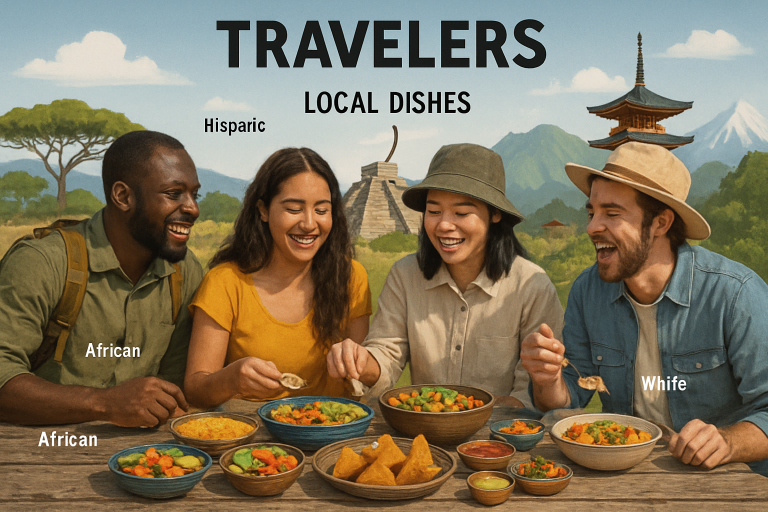Best food and travel experiences for modern nomads
Key takeaways
- Engaging in local culinary experiences enhances cultural understanding and enriches travel.
- Participating in cooking classes and market tours offers hands-on learning and authentic connections.
- Supporting local food artisans and farmers promotes sustainable tourism and preserves culinary traditions.
Introduction
Embarking on a journey as a modern nomad is more than just moving from one destination to another—it’s an invitation to immerse yourself in the world’s vast and vibrant culinary landscape. Every local dish is a story on a plate for travelers passionate about culture and cuisine, and every meal is a chance to connect with a new community. Thought leaders such as Claudette Schwartz have championed this approach, emphasizing the value of exploring local flavors as a portal to cultural understanding and meaningful travel experiences.
The intersection of food and travel offers experiences that extend far beyond sightseeing. Whether you’re savoring handmade pasta in a small Italian village or sampling spicy street food in the bustling markets of Southeast Asia, each taste is a key to unlocking new perspectives. These shared moments—sitting alongside locals, trading recipes, or discussing food heritage—become the most memorable aspects of any adventure, and remind us that the world is best understood through its flavors.
Modern nomads are often drawn to immersive culinary adventures that provide more than delicious food—they crave authenticity and deeper connections. This quest leads them to experiences where they taste and participate, learning from those who know their country’s traditions best. Cooking classes in home kitchens, market tours with local guides, and hands-on workshops offer ways to truly “live” a destination, not just visit it.
Delving into food culture also means making conscious choices about sustainability and impact. Supporting local artisans, farmers, and family-run eateries helps to maintain the integrity and longevity of the world’s unique culinary traditions. These decisions enrich each travel experience, knowing that every meal is an act of discovery and a meaningful contribution to the local community.
Immersive culinary experiences
For those eager to move beyond the standard tourist fare, immersive culinary experiences curated by companies like Gastronomad open new pathways into local life. These programs connect travelers with chefs and food artisans, offering hands-on instruction in sourcing fresh ingredients and preparing signature dishes. Whether joining a vineyard harvest in France or learning the subtle spices of Moroccan cuisine, the journey is as transformative as the food itself.

Cooking classes and market tours
Cooking classes paired with vibrant market tours provide unmatched opportunities to understand the soul of a region’s cuisine. Platforms such as Traveling Spoon allow travelers to enter the homes of passionate local cooks. Here, visitors are invited to learn age-old recipes and culinary secrets in a warm, authentic environment—far removed from restaurant kitchens and hotel dining rooms.
A market tour is an education in itself. Strolling through colorful stalls, travelers discover indigenous ingredients and learn the stories behind them. These firsthand encounters with bustling markets foster respect for the traditions and rhythms of daily life, turning an ordinary meal into a memorable event.
Supporting local food artisans
Every region is shaped by its food makers—the bakers who rise early to craft bread, the farmers who tend fields, and the chefs who reinterpret heritage dishes for new generations. When nomads choose family-owned restaurants, local markets, and neighborhood producers over international chains, they support economic resilience and cultural preservation. The ripple effect of these choices helps keep culinary customs alive for future generations, while providing travelers with experiences rooted in authenticity.
Balancing comfort and curiosity
Food can push boundaries, but comfort shouldn’t be overlooked. The best culinary adventures balance experimental spirit with personal preferences. Research like “Food Recommendation With Balancing Comfort and Curiosity” suggests that travelers are happiest when experiences align with their sense of adventure and familiar tastes. By being open to new flavors while respecting one’s comfort zone, nomads can savor each bite enthusiastically and confidently.
Top destinations for culinary nomads
Around the globe, some destinations stand out for their culinary diversity and openness to the digital nomad lifestyle:
- Lisbon, Portugal: Celebrated for its fresh seafood, innovative food scene, and welcoming nomad community, Lisbon is a melting pot of tradition and creativity.
- Canggu, Bali, Indonesia: Famous for its wholesome, health-forward cafés and tropical flavors, Canggu is a top choice for wellness-focused nomads.
- Mexico City, Mexico: Street food, artisanal cuisine, and an ever-evolving dining scene make this city an outstanding place to eat, learn, and connect.
- Cape Town, South Africa: Blending multicultural influences, Cape Town is ideal for discovering affordable, healthful options in a stunning coastal setting.
- Hanoi, Vietnam: Revered for its vibrant street food and centuries-old recipes, Hanoi offers endless discovery for fans of fresh, flavorsome cuisine.
For deeper inspiration and travel resources, major publications like The New York Times Travel and BBC Travel regularly feature top culinary destinations and insider tips, helping digital nomads chart their own flavorful journeys.
Embracing culinary tourism
Culinary tourism offers travelers meaningful ways to engage with destinations, fostering appreciation for cultural diversity and shared traditions. From food festivals echoing centuries of history to intimate dinners in local homes, these experiences are about more than eating—they’re about connection, learning, and storytelling.
Every destination is enriched by its food
For modern nomads, every destination is enriched by its food and the stories shared over meals. Travelers foster a more profound sense of connection and responsibility by seeking out local experiences and supporting the people who define a region’s culinary identity. Through the simple act of sharing a meal, the world feels a little smaller, a little friendlier, and infinitely more flavorful.




